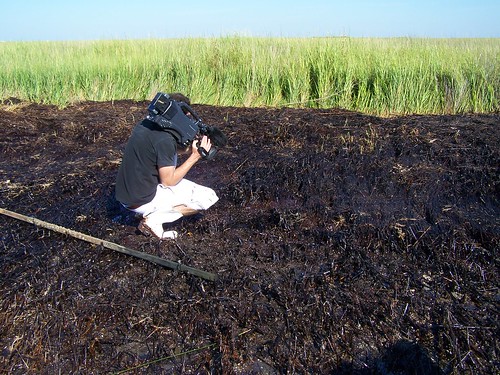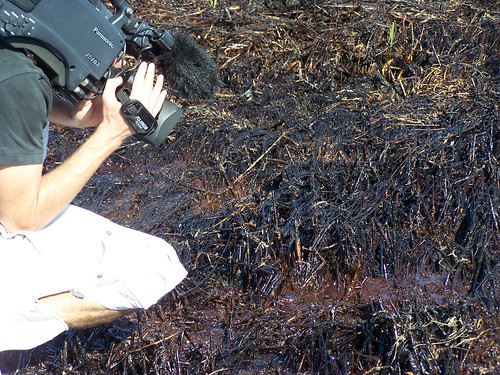BP's Well is Dead, But So Are the Fish
 On the day that BP and coast guard officials were high-fiving each other over permanently killing the well from hell, oil-soaked Plaquemines Parish suffered its third major fish kill in a week. That caused peripatetic parish president Billy Nungesser to take time off from his furious election campaign to blast federal and state officials who seem to find happy news at every turn. This is what Nungesser told Fox 8 TV in New Orleans on Sunday:
On the day that BP and coast guard officials were high-fiving each other over permanently killing the well from hell, oil-soaked Plaquemines Parish suffered its third major fish kill in a week. That caused peripatetic parish president Billy Nungesser to take time off from his furious election campaign to blast federal and state officials who seem to find happy news at every turn. This is what Nungesser told Fox 8 TV in New Orleans on Sunday:
We've never seen so many species floating in so many different areas. I'm begging the E.P.A., or somebody to quit worrying about pulling barges and pulling our boats out, and cutting down the size of the vessel of opportunity. I'm begging them to do their job, get out there and lets test, and see what the hell is going on in the water."
Here in Plaquemines Parish, where the oil and fishing industries coexisted peacefully, people have had enough of the rosy pronouncements coming out of mouths of policy makers. Last week the New York Times published a sanguine story about the situation, reporting that some scientists say the overall damage is not too bad and marshes seem to be recovering in some places. According to the Gray Lady, bird carcasses discovered so far number only in the thousands, not the tens of thousands, so perhaps the Louisiana wetlands dodged the bullet?
“That’s total BS,” says J.J., a veteran commercial fisherman from Buras who says the waters are poisoned with oil, the fishery is damaged, and that his friends have found dead birds and alligators that litter the interior of the marshes. “The oil is still coming in. Anything that dies out here sinks to the bottom, gets eaten or is taken away by BP.”
New reports and fisherman describe oil continuing to wash into the marshes and the beaches along the coast and bays of southern Louisiana. Last week an oiled baby sperm whale and a dolphin washed into the coast, according to fishermen and cleanup workers who saw them before they were hauled away by state authorities. What caused it? No one seems to have answers.
Earlier last week, a new wave of oil blew onto the shores of the Louisiana marshland and fresh oil was found in the interior bays of crude clobbered Barataria Bay, where a low lunar tide has exposed vast stretches of devastated wetlands and fresh oil bubbled to the surface. Unpublished pictures here show this is not old weathered tar balls as some officials are claiming.



Where is the oil coming from? There are few answers from officials. But fishermen here say it’s not surprising. They say it’s coming in with the tides and that the oil’s underwater and on the bottom. All it takes it the right wind, the right current, the right conditions, and the oil is back. Fishermen expect it will get worse this winter due to the shifting tides and change in sea temperature.
Last week, Fox News 8 in New Orleans reported that the Woodshole Oceanographic Institution's Research Vessel Oceanus returned from a month researching oil impacts in the Gulf and that scientists believe they saw substantial quantities of oil on the sea floor.
That doesn’t surprise Mike Brewer, a BP contractor and oil cleanup expert running for local council in Buras, who believes the oil will keep coming in for years. Brewer says workers on the beach still clean up one area, then come back the next day and the tar balls are right back in the same place, washed in with the tides. Like Sisyphus, workers seem to have an endless task of cleaning up the same tar balls that just keep rolling in.
Local fishermen who are actively fishing for shrimp report mediocre catches so far. Instead, they say they should be in record numbers. “Three months after Katrina, we were swimming in shrimp because no one had fished these waters for several months,” said one veteran Venice area shrimper. “Now after four months of no fishing, you have just 20 or 30 boats getting average catches at best. Just wait until 400 boats get out there…there will be nothing left.”
Reports of oiled shrimp and crabs getting caught in some areas continue to crop up. Last week, New Orleans WALB-TV in Mobile, AL, reported crabs caught in Louisiana’s St. Bernard Parish were coated in oil after being brought into the dock for sale. According to WALB-TV, seafood dealer Kevin Heir of B&K Crabbing said they tried to notify state officials about the oiled crabs but no one ever came to test them. When he inquired why later, he was told a state supervisor had quashed it, he told WALB.
"We dumped them in ice water, picked the box up, dumped them on the table, and the smell like to knock us down," Heier said. "[We] emptied the box of crabs and the water that was coming off the crabs on the table was just like a sheen."
Meanwhile on Sunday, word spread that BP was putting the kibosh on the local Vessels of Opportunity Program, a lifeline for hundreds of local fishermen who depend on BP’s clean up paychecks. Now many have no way to bring in money for their families. The seafood market here has crashed. Fishermen here say their reputation is about as good as BP’s.
“They poisoned our fish, they cut our paychecks and they’ve destroyed our way of life,” said a veteran fisherman here. “The oil companies down here will survive. But what will happen to us? What happens when Americans don’t have their fish anymore? ”
That’s a question no one can answer right now. Many here in the Louisiana bayou are just wondering how to put food on the table. Residents say charities have cut back on food programs because money from BP has run out. Fishermen are resigned to do the only thing many here know how to do; strap on their nets and troll the waters.
Even though some don’t believe it’s safe, there’s not much of an option at this point. They will head out at the crack of dawn and fish into the night just like they did during the days of Stonewall Jackson. But this time, some wonder if the battle is already lost.
Cross-posted from NRDC.
Rocky Kistner is NRDC’s communication associate in their Gulf Resource Center in Buras, LA. Before working with NRDC, he spent more than 20 years as a journalist working on investigative projects and stories for major print and broadcast media outlets.
